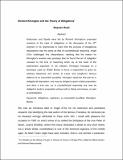Files in this item
Richard Kilvington and the theory of obligations
Item metadata
| dc.contributor.author | Read, Stephen | |
| dc.date.accessioned | 2015-09-28T10:10:01Z | |
| dc.date.available | 2015-09-28T10:10:01Z | |
| dc.date.issued | 2015-09 | |
| dc.identifier | 171453389 | |
| dc.identifier | 3886c0c5-7520-49ed-b1ad-b89f1ea08a10 | |
| dc.identifier | 84942427581 | |
| dc.identifier | 000367510200014 | |
| dc.identifier.citation | Read , S 2015 , ' Richard Kilvington and the theory of obligations ' , Vivarium , vol. 53 , no. 3 , pp. 391-404 . https://doi.org/10.1163/15685349-12341306 | en |
| dc.identifier.issn | 0042-7543 | |
| dc.identifier.other | ORCID: /0000-0003-2181-2609/work/62668506 | |
| dc.identifier.uri | https://hdl.handle.net/10023/7552 | |
| dc.description.abstract | Kretzmann and Spade were led by Richard Kilvington’s proposed revisions to the rules of obligations in his discussion of the 47th sophism in his Sophismata to claim that the purpose of obligational disputations was the same as that of counterfactual reasoning. Angel d’Ors challenged this interpretation, realising that the reason for Kilvington’s revision was precisely that he found the art of obligation unsuited to the kind of reasoning which lay at the heart of the sophismatic argument. In his criticism, Kilvington focussed on a technique used by Walter Burley to force a respondent to grant an arbitrary falsehood and similar to Lewis and Langford’s famous defence of ex impossibili quodlibet. Kilvington observes that just as in obligational disputation, one may be obliged to grant a false proposition and deny a true one, so in counterfactual reasoning one may be obliged to doubt a proposition whose truth or falsity one knows, on pain of contradiction. | |
| dc.format.extent | 15 | |
| dc.format.extent | 176622 | |
| dc.language.iso | eng | |
| dc.relation.ispartof | Vivarium | en |
| dc.subject | Obligations | en |
| dc.subject | Sophisms | en |
| dc.subject | Ex impossibili quodlibet | en |
| dc.subject | Kilvington | en |
| dc.subject | Burley | en |
| dc.subject | B Philosophy (General) | en |
| dc.subject.lcc | B1 | en |
| dc.title | Richard Kilvington and the theory of obligations | en |
| dc.type | Journal article | en |
| dc.contributor.institution | University of St Andrews. Philosophy | en |
| dc.contributor.institution | University of St Andrews. Arché Philosophical Research Centre for Logic, Language, Metaphysics and Epistemology | en |
| dc.contributor.institution | University of St Andrews. St Andrews Institute of Medieval Studies | en |
| dc.identifier.doi | https://doi.org/10.1163/15685349-12341306 | |
| dc.description.status | Peer reviewed | en |
This item appears in the following Collection(s)
Items in the St Andrews Research Repository are protected by copyright, with all rights reserved, unless otherwise indicated.

